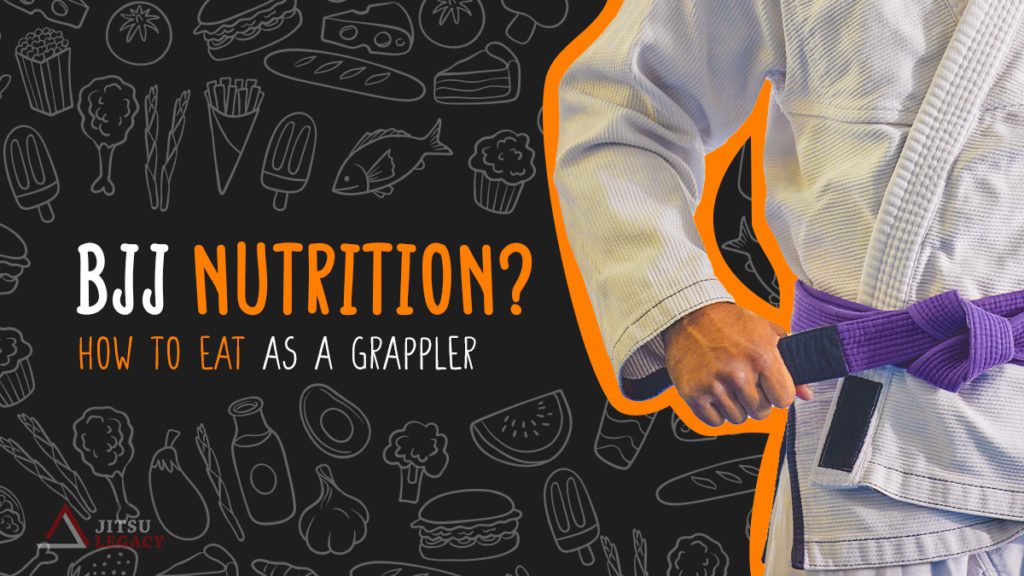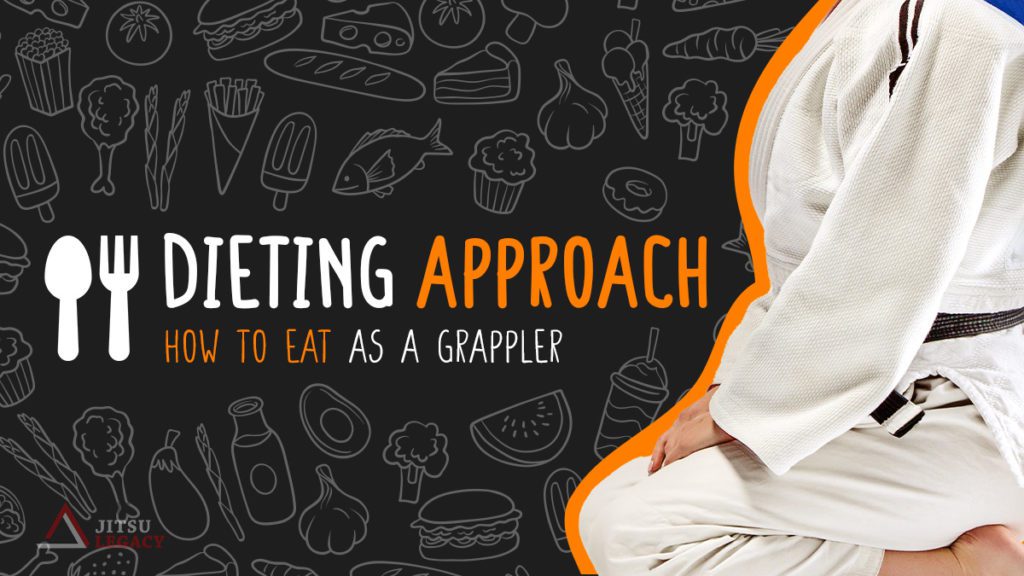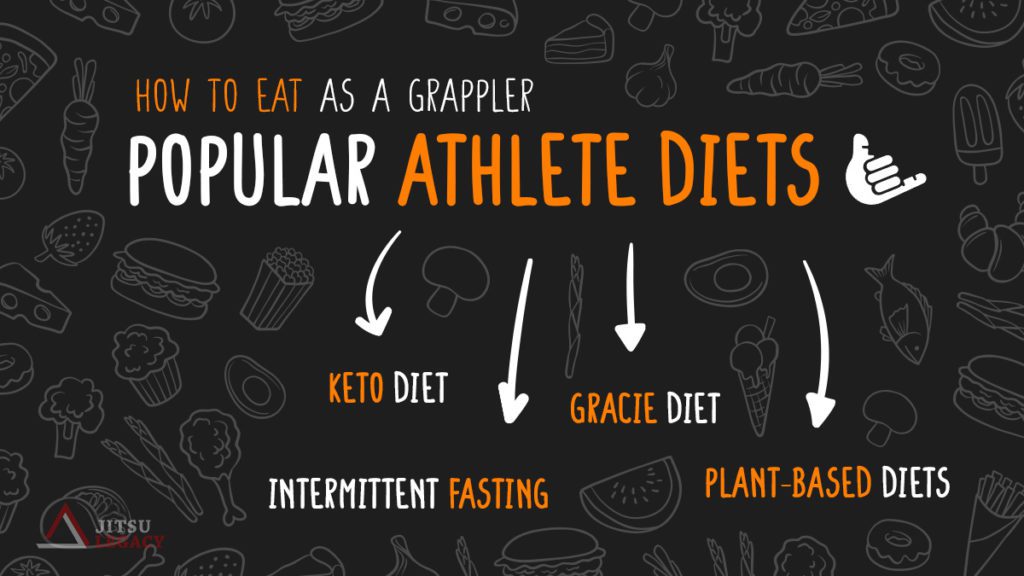Technical training, physical training, and nutrition. Those are the three staples of any combat athlete’s daily life, including BJJ athletes. The training aspects are something that we talk about often, but for some reason, people tend to give nutrition the back seat and take it for granted. Given that how you eat is the foundation for any athletic endeavor you part take in, taking it seriously would be high on the priorities list. So, let’s talk food, and BJJ nutrition 101.
How Food Works
There’s no point in me trying to write about different diets or what is best for a BJJ athlete to eat unless it is clear to everyone how food actually works.
There are three major biochemical building blocks in food: protein, carbohydrates, and fat. Those are the macronutrients. There are also minerals, vitamins, and some other compounds which are addressed as micronutrients, because they play a smaller, albeit vital role in what we take away from food.
Anytime you put food in your mouth, your body is looking for these biochemical compounds, and in particular the macronutrients. Every piece of food you eat gets digested in order to degrade it to protein, fat, and/or carbohydrates.
Protein is the literal building block of everything. Apart from playing a crucial role in the muscular system, protein also plays a role in hormones, neural pathways, skin integrity, and a bunch of other things you might be taking for granted. The proteins we ingest get broken down to their building blocks, amino acids, in order for the body to shuffle different amino acids around and use them to build the proteins it needs.
Carbohydrates (carbs) are the body’s fuel source. They come in different forms and have the simple task of supplying energy to the cells in our bodies for their daily metabolic needs. They play a role in thousands of biochemical processes in our bodies.
Fats are the main substrate for some of the body’s most important hormones, and I don’t just mean sex hormones like testosterone here. Fats also exist in different forms inside the human body and can be used as an alternative energy source when the body runs out of carbohydrates, which tends to happen quite fast under physical stress.
Different foods are rich in different macronutrients. For example, meat is a great protein source, which, depending on the cut, can also be a solid fat source as well. Moreover, meat is rich in minerals and essential amino acids as well.
Fruit is a great example of food that provides carbohydrates to the body. The carbs in fruits are easy for the body to digest and use, mainly because of the biochemical structure they are in, which is called fructose.
Fats are found in nuts, seeds, avocados, oil, etc. They are also available in different forms, some easier to digest than others.
For a balanced diet, as human beings from a biological standpoint, we need all three of these macronutrients in order to provide our bodies with optimal sustenance. This does not mean that you can’t survive by greatly reducing the intake of one of the three, but it means your body is going to struggle to perform.
BJJ Nutrition: Is There Such A Thing?

Even though I use the term BJJ nutrition, I do not really like it. To be more precise, I do not like the meaning people assign to it when they use it. It is the same with MMA nutrition, football nutrition, baseball nutrition, etc.
At the end of the day, understanding the demands of a specific sport is very important, but that doesn’t mean that a diet that you will come up with to help you perform better in that sport is only going to help your body be better at that specific sport.
Nutrition does not work like that, as the body cannot think ahead of time about what it is going to need. It will make the best out of what you provide it with. This means that nutrition and its efficiency are defined at an individual level, rather than a sports level.
So, when I say BJJ nutrition, I mean eating to fuel the body’s energy demands for the sport we love so much. However, you can use the same approach to eat for marathons, rock climbing, or water polo. The body is very adaptive and will make the most out of what you provide it with, but your own genetics will play a huge role in that.
So, back to BJJ nutrition. Our body needs food in order to achieve two things. The first is to function on a daily basis in terms of all the processes it needs to undergo just to keep you alive. This is called basal metabolism, and it requires protein fat and carbohydrates in order to work optimally.
In other words, even if you are sleeping all day, every day for a week, you will still need to eat at least once a day. That is because the body is still going to spend energy for its basic metabolic needs.
Anything past this is all about the body’s demands in terms of performance. If all you do is drive to work and back, your body won’t need a lot more than the basic metabolic minimum. However, if you walk to work, or ride a bicycle, the body’s demands increase. If you actively train, especially in a demanding sport such as BJJ, the body’s nutritional needs get bigger.
At the end of the day, BJJ nutrition is about giving your body the optimal amount of food, containing the best ratio of macro and micronutrients in order to provide it with energy and building blocks for its basic metabolic needs, and any and all sports-performance requirements.
A Minimalist Approach to Dieting

The best way to approach BJJ nutrition is to think about buildings a diet plan for yourself. I stress the “yourself” part because it is not really feasible that your diet is going to work as well for someone else.
The most important thing about designing a diet to fuel your training is to pick methods of eating that you know you will be able to follow without feeling like it is a chore. For example, if you like eating many smaller meals throughout the day, you can organize your diet that way. If you like to gorge a couple of times a day, and not eat for the remainder of it, you can also make it work. It all depends on you.
That said, there are some aspects of dieting you should dial in whenever you are thinking about designing a diet for yourself.
Food Timing
When you eat does make an important impact on how well food is resorbed in the body, and how many nutrients are being used. For example, eating a huge meal right before training BJJ is only going to make training difficult, as your body is not going to e digesting food while others are trying to tear your limbs away.
The key things to consider are to give your body food after you wake up, given that this is a period of the day that it really needs nutrients. You can get away without eating breakfast, but if you want your body to be ready for everyday life and BJJ training, you need to provide it with sustenance early on.
The second key moment for consuming food, in terms of BJJ nutrition, is before training. However, it is important to know that you should not eat much, you should at least a couple of hours before training, and you need to know exactly what you are going to eat for optimal performance.
Last but not least, post-workout nutrition is also key in terms of providing your body with everything it requires to rebuild all the tissue that has been broken down in training, as well as restock its energy supplies.
You can go further than this with food timing, but if you want to keep things simple, make sure you eat at these three crucial periods of the day.
Food Choices
This is where things get really tricky. First of all, you get so many choices in terms of food that it is impossible for any diet to address them all. That is why many diets tend to pick a few centerpieces in terms of food and restrict or completely cut out others. I am not a big fan of restrictive diets, as they mess around with the key thing about dieting I wrote about earlier – making the diet easy to stick to.
If you truly want to eat in a way that is optimal for your body, you need to think in terms of food that is easy to digest and provides you with the best amount of macro and micronutrients. In other words, this is what all that “healthy eating” thing is about.
The less processed the food is, the easier it is for your body to break it down, and the more it can extract from it. It is as simple as that.
Does that mean you can’t eat processed stuff at all? No. Eat whatever you want, as long as you get the majority of your food from sources that will help your body perform whatever you want it to perform. In our case, that is Jiu Jitsu.
Food Preparation
While the way you prepare food *frying, boiling, baking, broiling, grilling, etc) does impact how many nutrients you’ll get out of it, it is definitely not a defining factor.
Here, the rule of thumb about not making a diet feel like a chore is more important. Combine that with solid food choices, and you will not end up with many foods that you’ll enjoy deep-fried or prepared in another fashion that strips them of any nutritional value.
That said, do not shy away from cooking with oil, frying food, etc. Flavor is an important factor in dieting, as you won’t be able to sustain a diet of boiled chicken for too long. The bottom line is not to put too much emphasis on how food is prepared.
And no, cooking things will not degrade the nutrients. It will just break them down into building blocks, which the body does anyway.
Food Quantity
How much food you consume is, of course, down to you, How much food you need will be determined by a bunch of factors like your age, sex, size, daily physical activity, etc.
At the end of the day, if you eat more food than what you need, your body will hold on to some of it “for rainy days”. In other words, that is how you gain weight. If you eat less than the energy you spend on a daily basis, you will lose weight because you’re providing your body with less energy than it consumes. The math here is easy.
Oh, and if you eat less than your basal metabolic needs, you will get sick.
These are the only things in terms of food quantity you need to consider. There’s no point in trying to measure out every little bit of food you put on your plate trying to pinpoint your metabolic needs as they change constantly. Just keep things simple.
Popular Athlete Diets

Let’s look at e few diets I am certain you’ve heard of or at least given a try. Fair warning, I have something to say about all of them.
Keto Diet
Getting your body to only use fats as an energy source is possible, but it is extremely difficult to do. The bottom line is that in order to achieve a physiological state of ketosis, you need a certain amount of keto bodies in your blood. Those are by-products of metabolizing fat as an energy source.
If you do not use exogenous ketones (supplements) you will not be able to achieve such a state, simply because carbs are in anything you eat. Yeah, even meat and eggs have carbs, and they’ll kick you out of ketosis if you’re not careful.
In other words, eating nothing but meat bacon, and avocados are not going to help your body perform better on the mats. If anything, restrictions make it work more to figure out how to satisfy the energy demands.
Intermittent Fasting
This is a method of eating that has you eating during an 8-hour window, and fast for the rest of the day (16 hours). As a method it is effective, the only trouble is, people, mess it up when they attempt it.
Fasting means that nothing, and I mean nothing but water, can enter your digestive tract during the fasting period. Otherwise, digestive enzymes and processes get triggered even if there’s no food being ingested.
If you truly want fasting to work, the best option is too fast at night, while you’re sleeping, and time it so that you can still follow the rule of thumb of eating breakfast. That means that if you want to fast, you should kiss that huge post-training meal goodbye.
Gracie Diet
I am not at all a fan of diets that are specific for BJJ nutrition, or other sport nutrition, simply because they make no sense. The Gracie Diet is such an example. It has nothing to do with a system of eating that makes any sense. It is simply a diet that Helio Gracie found works for himself. As I said, nutrition is highly individual.
The Gracie Diet overcomplicates things by dividing foods into groups and not allowing different food groups to mix together. Not worth your time or effort, if you ask me (and I followed it for a couple of years, as I have done with every other diet I describe here).
Plant-Based Diets
This is where things can get personal. I will pull the band-aid off immediately: vegetarian eating is sustainable and can be good for you. A vegan diet is a bad choice.
Simply put, as humans we are omnivores, meaning we have evolved to eat both plants and meat. Deciding not to consume meat for whatever reason is okay from a nutritional and athletic standpoint, as long as you keep eating other animal products (dairy, eggs, etc.). In simple terms, there are nutrients in animal products that you can’t find in plants.
That is why veganism is not something that is good for the body, regardless if you are training or not.
In Conclusion
When you think of BJJ nutrition, you should not be thinking about some fancy diet that is designed only for grapplers. Instead, you should think about what will help you as an individual performs better on the mats. As long as you pay attention to food choices, food timing, and food quantity, and remember not to give up on flavor, you’ll be able to come up with a diet that you can follow with ease.

Ogi is a black belt that does Jiu Jitsu full time and is very passionate about anything grappling-related.
He is also the head coach of Enso Jiu Jitsu in Macedonia and an aspiring Globetrotter.
